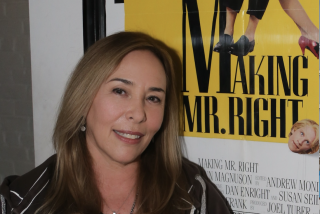Book Review: ‘Sempre Susan: A Memoir of Susan Sontag’ by Sigrid Nunez
Sempre Susan
A Memoir of Susan Sontag
Sigrid Nunez
Atlas & Co.: 140 pp., $20
When novelist Sigrid Nunez accepted a part-time job helping Susan Sontag cope with correspondence that had built up during her first bout with cancer, she thought that she’d found exactly the job she needed: one that would not interfere with her own writing. She didn’t realize she would also find a mentor, a friend and an antagonist in Sontag, and that 30 years later she would still be organizing her bookshelves and watching movies in the way that Susan — for she was always “Susan,” as the title suggests — thought best.
Any memoir of another person is a delicate undertaking. Especially so when you are writing about your ex-boyfriend’s mother. Not long after Nunez arrived at Sontag’s book-filled but otherwise spartan penthouse on Riverside Drive in Manhattan, she began dating Sontag’s son, David Rieff, who lived there part time. Soon Nunez would move in as well, a third wheel to a mother-son relationship so intense that literary New York speculated about its nature. She recalls Sontag saying that, because their relationship was so difficult, David and she had “always needed to have a third person around.’”
“She didn’t like the word ‘girlfriend’ much; she preferred ‘friend,’ though she sometimes referred to me jovially as David’s ‘consort,’” Nunez writes. “She referred to the three of us as the duke and duchess and duckling of Riverside Drive. I knew that wasn’t good.”
Although Rieff has stressed that he is “not a confessional person” and has no intention of writing about his relationship with his mother — or, one assumes, the strange triangle they formed with Nunez in the late 1970s — “Sempre Susan” does offer an interesting counterpart to his sad and beautiful 2008 memoir of Sontag’s last months before her death in 2004, “Swimming in a Sea of Death.” Both seem honest, balanced and somewhat reluctant records; it is hard to read Nunez’s painstaking account of the Trouble on Riverside Drive without wondering whether Rieff read it in manuscript and what he thought of its more confessional nature. Together, the memoirs give a sense of what it may have been like to know Sontag — her vitality, her endearing enthusiasms, her neediness and insecurities. “In spite of all her passions, her huge appetite for beauty and pleasure, her famous avidity, and the unflagging pace of her enviably rich life,” Nunez writes, “she was mortally malcontented, and … a sense of failure clung to her like widow’s weeds.”
Anyone looking for lurid revelations will be disappointed, but I was taken aback to learn that Sontag often revised her writing with the help of a friend, someone who would even move in for a while, sleeping a few hours a night, like Sontag, and helping her comb endlessly through her drafts. She hated to be alone. I found this more shocking than the news that she took speed during these marathon revision sessions, which just makes me want to take speed myself.
Although Nunez’s relationship with Sontag and Rieff unraveled badly, “Sempre Susan” is a loving memoir, full of arresting details and an occasional spirited defense of her mentor. For a New York Times profile on the publication of her novel “The Volcano Lover,” Sontag remarked that all her work says, “be serious, be passionate, wake up.” Clearly someone was listening.
Marler is the editor of “Queer Beats: How the Beats Turned America on to Sex.”
More to Read
Sign up for our Book Club newsletter
Get the latest news, events and more from the Los Angeles Times Book Club, and help us get L.A. reading and talking.
You may occasionally receive promotional content from the Los Angeles Times.








